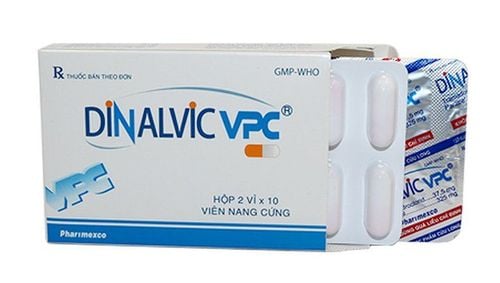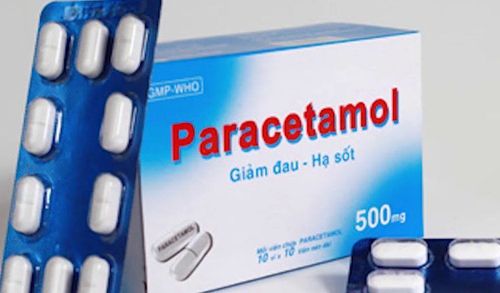This is an automatically translated article.
Paracetamol is an over-the-counter pain reliever and fever reducer, commonly used quite widely in treatment. Unlike aspirin or other nonsteroidal anti-inflammatory drugs, Paracetamol is believed to be safe for use in patients with acute peptic ulcer disease.1. Does Paracetamol cause stomach ulcers?
Paracetamol (acetaminophen or N-acetyl-p-aminophenol) is the active metabolite of phenacetin. Paracetamol is an effective pain reliever - antipyretic, but the drug is not effective in treating inflammation. Paracetamol has analgesic and antipyretic effects similar to aspirin in equal doses per gram.
Paracetamol lowers body temperature in febrile patients, but rarely in normal people. Paracetamol acts on the hypothalamus causing hypothermia, increased heat loss due to vasodilation and increased peripheral blood flow.
With therapeutic doses, Paracetamol does not change the acid - base balance, does not cause irritation and damage to the gastrointestinal mucosa, does not cause ulcers or stomach bleeding as when using Salicylate.
Paracetamol is considered an effective pain reliever, antipyretic and very safe. According to the World Health Organization classification, Paracetamol is a first-line analgesic. Paracetamol is the preferred non-opioid analgesic for patients with risk factors for upper gastrointestinal disease in clinical practice. ready.
2. Some other stomach upset drugs
Many patients with osteoarthritis or rheumatoid arthritis regularly take nonsteroidal anti-inflammatory drugs (NSAIDs) to relieve pain or inflammation in the joints. Commonly used NSAIDs contain acetylsalicylic acid (such as Aspirin), Ibuprofen, Diclofenac, and Naproxen.
One downside of these drugs is that they often cause stomach and duodenal problems when taken for several weeks or months, leading to acute stomach ulcers. NSAIDs reduce the production of prostaglandins, which work to increase the production of mucus in the stomach and substances that neutralize stomach acid. If there is too little prostaglandin, the lining of the stomach is more susceptible to damage from stomach acid, leading to inflammation and possibly the development of a stomach ulcer.
Certain medications to prevent ulcers Several different medications can reduce the risk of acute peptic ulcers, commonly used as proton pump inhibitors (PPIs) and H2 blockers. Both drugs reduce acid production in the stomach. The hormone-like misoprostol is also sometimes used, although less often.
Risk factors for acute stomach ulcers when taking NSAIDs Not everyone who regularly takes NSAIDs will need medication to protect the stomach. This largely depends on the individual patient's risk of developing peptic ulcers. Some risk factors for stomach ulcers when using NSAIDs such as:
Adults > 65 years old; History of peptic ulcer; Take several different pain relievers at the same time.
3. Recommendations when using pain relievers
Care should be taken in choosing pain relievers depending on the medical condition. Should use first-line pain relievers, paracetamol should be chosen as the first drug, used in the right dose and not for a long time. If the pain does not improve or improves, and then recurs, you should visit a medical facility to be examined, determine the exact cause and use the appropriate pain reliever. You should not arbitrarily use any pain reliever that you do not know, which can lead to addiction and dangerous complications.
Paracetamol is the preferred non-opioid analgesic for patients with risk factors for upper gastrointestinal disease in clinical practice. Using Paracetamol is unlikely to cause acute gastric ulcer in patients. To use pain relievers safely and effectively, it is best to consult with your doctor to determine the right cause and use the right medicine for your condition.













